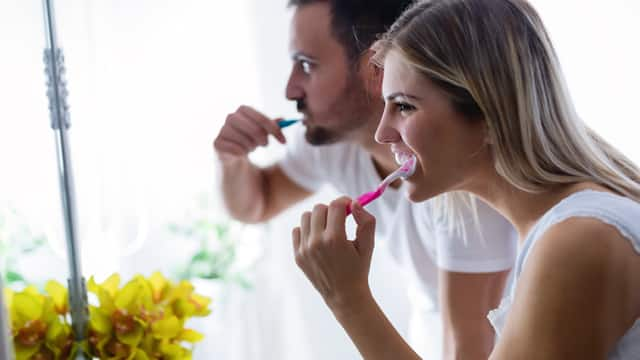Good oral hygiene habits can often prevent tartar from building up on your teeth. But you'll need the help of your dentist and dental hygienist to remove the build-up once it develops. Read on to learn what these tartar deposits are, how your dental professional removes them, and how to prevent them.

Tartar Deposits on Teeth: Treatment and Prevention
What are Tartar Deposits on My Teeth?
"Tartar deposits"— also known as calculus — are a hardened layer of plaque or dental biofilm. Tartar is made of calcium phosphates, among other compounds, and looks white or off-white, so you may hear it called calcium.
Tartar can form anywhere on the tooth surface. It can be especially troublesome when it builds up between the teeth because many people neglect to clean between their teeth with floss, water flossers, or other interdental cleaners. Tartar irritates the gums and serves as a rough surface where disease-causing bacteria can collect, leading to periodontal disease and even inflammation in other parts of your body.
How Does Tartar Form?
Tartar build-up occurs when the accumulated bacteria that grow on teeth harden on the tooth surface. Tartar is typically found on the inner surface of the front teeth and the outer surface of the upper molars next to the cheeks. These are common areas because salivary duct openings continuously feed saliva (which includes calcium) into the mouth.
Removing Tartar Deposits
Only a dental professional can remove tartar build-up on your teeth. They will scale the teeth with instruments specifically designed for this purpose. These tools can be metal-tipped hand instruments or ultrasonic tools that use specific wavelengths to remove tartar. If it's been a while since you've visited your dental hygienist, scaling may take more than one visit. If the tartar on the tooth surface is deep below the gum line, you may need deep cleaning with local anaesthesia to ensure your comfort.
Dental hygienists are trained and knowledgeable about working with patients, and they provide optimal preventive oral health care. You should never try to scale your teeth at home, whether with store-bought dental kits or household objects like toothpicks. Trying scaling at home may damage your enamel or lead to further inflamed or bleeding gums.
Preventing Tartar Build-up
The best way to prevent tartar build-up on teeth is to keep them clean by thoroughly brushing and cleaning between your teeth every day and having your teeth cleaned professionally at least twice a year. Some people build up tartar more quickly and need more frequent dental hygiene treatment, but following your dental hygienist's care plan will improve your oral health.
Brushing with fluoride toothpaste helps prevent plaque, gingivitis, tartar build-up, cavities, and bad breath. Faithful daily oral hygiene practices and regular visits to your dental professional will help minimise dental problems and keep your mouth healthy.
This article is intended to promote understanding of and knowledge about general oral health topics. It is not intended to be a substitute for professional advice, diagnosis or treatment. Always seek the advice of your dentist or other qualified healthcare provider with any questions you may have regarding a medical condition or treatment.






